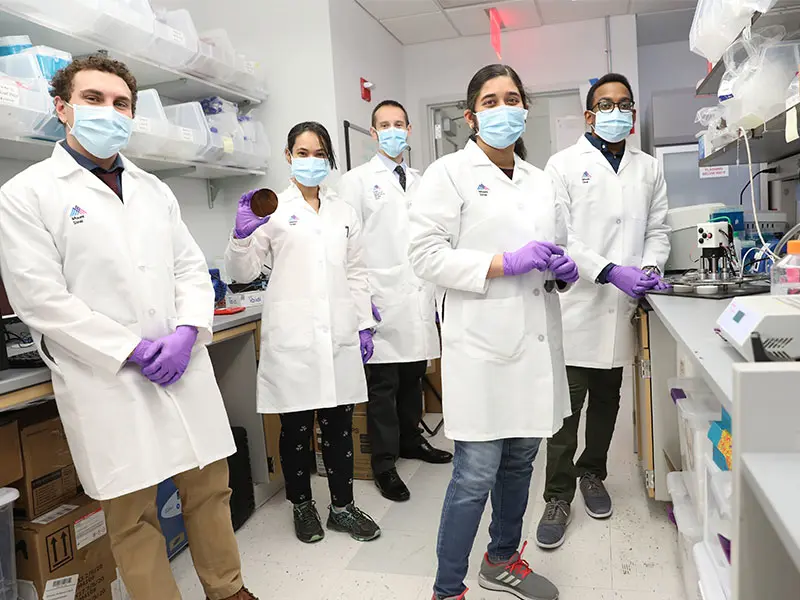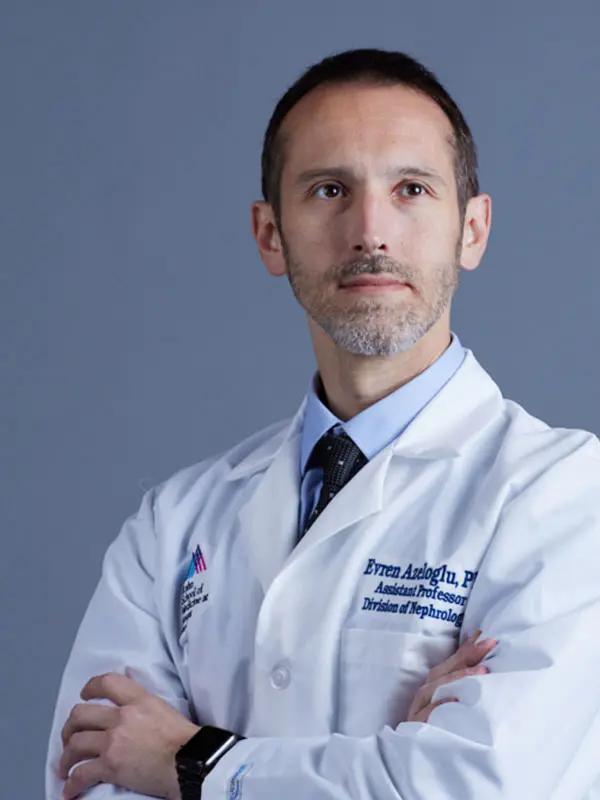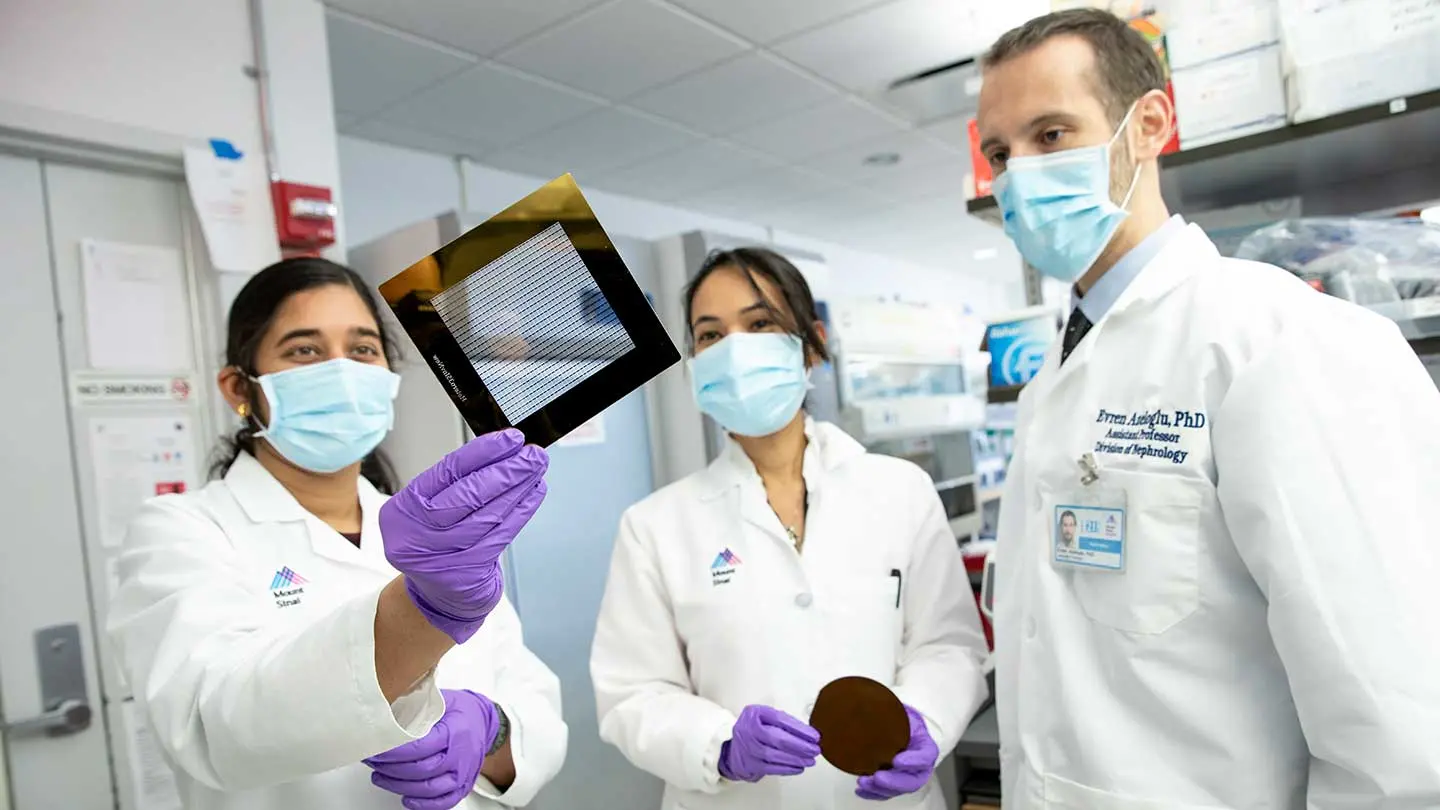Nephrology once led the way in attracting and integrating engineers to develop innovative therapeutic approaches, such as complex dialysis systems. But over the years other subspecialties have proven more successful in recognizing and capitalizing on the potential of engineering to resolve research challenges. Mount Sinai Health System is working to change that.
“There has not been a major development in dialysis technology for a long time,” notes Evren Azeloglu, PhD, Associate Professor of Medicine (Nephrology) at the Icahn School of Medicine at Mount Sinai. “This is a field that is wide open for innovation. I believe the massive opportunities to make meaningful change will appeal to the next generation of engineers, but we must introduce them to the field early and show them how they can make an impact.”
Dr. Azeloglu is facilitating that introduction through the Multidisciplinary Engineering and Renal Research for Innovation of Technology (MERRIT) program, a National Institutes of Health (NIH)-funded joint initiative that brings together nephrology researchers at Mount Sinai and engineering educators at The Cooper Union in New York City's East Village. Its mission is to connect young engineers with top talent in nephrology and equip these engineers with knowledge to accelerate innovation in kidney disease research and products. The program is co-directed by Dr. Azeloglu and Eric Lima, PhD, Professor of Mechanical Engineering at The Cooper Union.
“We recognize that most engineers do not become researchers; they are attracted, instead, to the design and development of new technologies,” Dr. Azeloglu says. “So, through our multifaceted program, we will introduce engineers to the breadth and depth of nephrology, spark their entrepreneurial spirit, and encourage them to pursue therapeutic breakthroughs that make a difference in our patients’ quality of life.”
“There has not been a major development in dialysis technology for a long time, This is a field that is wide open for innovation."
Evren Azeloglu, PhD
The program is recruiting patient-centered student design teams that will work on developing real-world solutions to common clinical issues. Topics will be assigned by Mount Sinai physicians, who will serve as co-mentors to the teams along with engineering instructors at The Cooper Union. Projects will also be vetted by Kirk Campbell, MD, Associate Professor of Medicine (Nephrology), and Director of the Nephrology Fellowship Program at the Icahn School of Medicine, to ensure they address relevant clinical problems. Dr. Campbell is an NIH-funded physician-scientist who, in addition to leading one of the largest and most successful nephrology training programs in the country, will bring expertise in identifying unmet clinical needs amenable to engineering-based solutions.
“Essentially, we are transforming the students’ capstone graduation projects into an accelerator initiative,” Dr. Azeloglu explains. “The teams will work on challenges related to kidney transplants, peritoneal dialysis, renal replacement therapy, implants, palliative care, and biopsy technologies, and funding will be available through the program so they can access cutting-edge materials and commercial prototyping services. That means they will be able to tackle these projects in the same way they would if they were working for an engineering firm or running their own company.” Dr. Azeloglu adds that the design teams will receive support from Mount Sinai Innovation Partners, which facilitates the real-world application and commercialization of Mount Sinai Health System discoveries.

From left: Jonathan C. Haydak, PhD candidate; Smiti Bhattacharya, PhD candidate and NIDDK F-31 predoctoral fellowship awardee; Evren Azeloglu, PhD; Nanditha Anandakrishnan, PhD, postdoctoral fellow; Jacob Wright, MSBS candidate
The program will also fuel innovation in therapeutic approaches through 10-week paid summer kidney research fellowships. Up to six students will be accepted to the fellowships, which are open to any undergraduate or master’s student currently enrolled at an accredited university across the country. Each student will be paired with one of the Division of Nephrology’s 17 research labs and be assigned co-mentors at The Cooper Union and Mount Sinai, who will advise them over the course of their research projects. Students will also develop a poster presentation of their projects for the Summer Undergraduate Research Symposium at Mount Sinai.
“We have very stringent requirements stipulating that the research projects must not only serve as an introduction to the field but also have tangible results,” Dr. Azeloglu says. “That is somewhat of a challenge for a lot of research labs, but we want to ensure the students gain real research experience.”
The program had a soft launch in 2020 due to the COVID-19 pandemic and Drs. Azeloglu, Campbell, and Lima plan to have MERRIT fully up and running by February 2021. They are in talks to expand it to other engineering schools and are developing digital education content for the program’s website and social media. “The plan is to include the student presentations from the Summer Undergraduate Research Symposium,” Dr. Azeloglu says. “Our hope is that, when engineering students visit the MERRIT website and see what their peers are doing in the program, they will be inspired to apply for a fellowship or to explore the many ways they can have an impact on the field of nephrology.”
Featured

Evren Azeloglu, PhD
Associate Professor of Medicine (Nephrology), and Pharmacological Sciences
